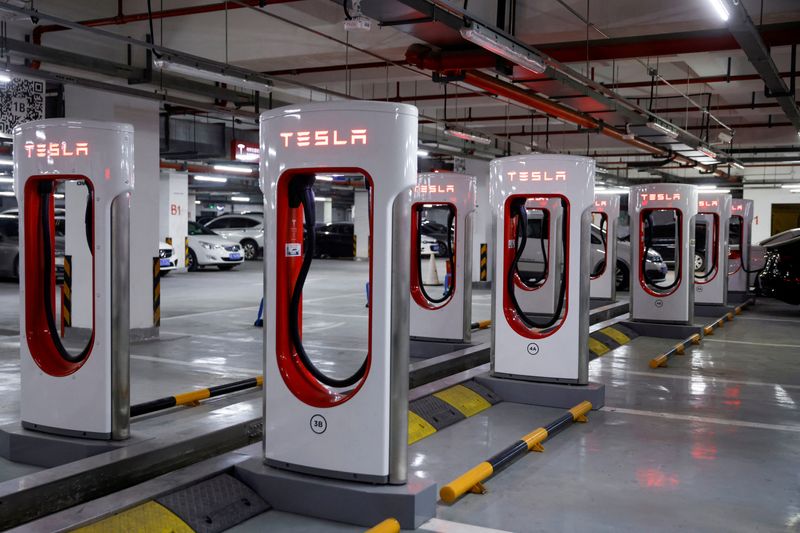By Abhirup Roy, Hyunjoo Jin and Isla Binnie
SAN FRANCISCO (Reuters) - Ford Motor (NYSE:F) Co's decision to allow customers to use Tesla (NASDAQ:TSLA)'s electric-vehicle charging network has sent ripples through the industry, raising questions about a national U.S. charging standard as well as the fate of charging startups that are struggling.
The deal, announced last month, would open more than 12,000 Tesla Superchargers to drivers of Ford vehicles in North America starting in 2024.
The tie-up puts pressure on other companies and the administration of U.S. President Joe Biden to fall in line or spend more to up their games, according to industry executives, investors, bankers and consultants.
"Tesla's head start in the space and Ford's buy-in ... will require companies who have invested in other technologies to pivot, which will be an expensive proposition," said Paul Baiocchi, chief ETF strategist at SS&C ALPS Advisors.
SS&C has invested in such charging companies as ChargePoint Holdings Inc, EVgo Inc and Blink Charging Co (NASDAQ:BLNK).
The Ford deal was a boost to Tesla's more widespread, reliable North American Charging Standard (NACS) and dented the value of smaller players offering the rival Combined Charging System (CCS). Tesla CEO Elon Musk hopes the deal with Ford, the No. 2 seller of EVs in the U.S., will help make Tesla's technology the North American standard.
Now those players face pressure to upgrade their networks to work with Tesla's at a time when many lag in customer service and lack the funds to make such a commitment.
The Biden administration did not respond to requests for comment, but Transportation Secretary Pete Buttigieg told CNBC after the Ford-Tesla deal that the administration was "not going to pick winners and losers in terms of what standard prevails." He added the industry will eventually converge on one system but that adapters would allow cross usage.
CharIn, a global association to promote CCS, said deals like the Tesla-Ford one "create uncertainty in the industry and lead to investment obstacles."
The U.S. government previously set aside $7.5 billion in federal funds to push companies to adopt CCS as part of Biden's plan to tackle climate change by converting 50% of all new U.S. vehicle sales to EVs by 2030.
Holding back EVs has been a weak CCS charging infrastructure that many complain is inefficient or sometimes inoperable, leading prospective buyers to fear becoming stranded on the road with nowhere to charge.
But installing and maintaining a charging network is capital-intensive and, with EVs representing only 6% of new car sales in the U.S. last year, making money in charging is difficult, industry officials said. Most automakers have not created their own charging networks.
ACCELERATE CHANGE
That financial pressure may only intensify if more companies adopt Tesla as the industry charging standard, pushing more deals like Shell (LON:RDSa)'s $169 million buyout of Volta earlier this year or BP (NYSE:BP)'s late 2021 acquisition of AMPLY Power.
"There was already some consolidation happening in the space and now I think that will only accelerate," Lazard (NYSE:LAZ) banker Mohit Kohli said.
The Biden administration's push has so far supported the CCS connector favored by such carmakers as Volkswagen AG (OTC:VWAGY), General Motors Co (NYSE:GM) and BMW. Tesla adopted that standard in Europe under pressure from regulators there, and is gradually opening a portion of its U.S. network to vehicles using CCS to potentially qualify for subsidies.
Complaints about other charging companies' software bugs or broken charging hardware only opens the door to greater access for Tesla's standard, however, industry officials said.
Under its new deal, Ford will distribute Tesla adapters to customers and starting in 2025 will equip future EVs with NACS. It was not clear whether those adapters will be available to other automakers' customers.
Some companies are already making plans to adopt Tesla's technology, but a lack of a national standard could cause more headaches, industry officials said.
"We are now probably locked in to having two separate charging standards co-existing for the foreseeable future," Consumer Reports senior policy analyst Chris Harto said.

FreeWire CEO Arcady Sosinov said his company plans to offer NACS connectors at its fast chargers by mid-2024, while Aptera Motors CEO Chris Anthony said the U.S. government should invest in the Tesla network if it becomes the predominant standard.
"Because of this announcement ... there's going to continue to be a standards war for a decade or more," Sosinov said.